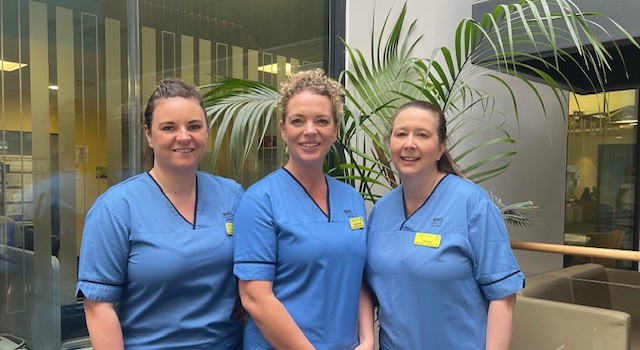
The Specialist Perinatal Mental Health midwives marked their three year milestone with NHS Greater Glasgow and Clyde this week.
As part of Maternal Mental Health Awareness Week (29th of April – 5th of May), the midwives aim to leverage their service marker to highlight the support that is available to pregnant women and parents.
Developing on from the existing clinical psychology service, the NHS Greater Glasgow and Clyde (NHSGGC) Maternity & Neonatal Psychological Interventions (MNPI) service was expanded in April 2021 and is a hospital-based team of clinical psychologists and specialist midwives who provide psychological support to families that have experienced a complex pregnancy, birth, neonatal complications, or recurrent loss.
Their value to GGC women and parents is highlighted through the number of new referrals the service receives, which sits at an average of 200 per month in GGC.
Additionally, there is also the community Perinatal Mental Health Service (PMHS), a specialist multidisciplinary team who provides care and treatment to women who are experiencing or at risk of significant mental health problems. The PMHS are celebrating their 20th anniversary milestone this year.
Stephanie Mair, an NHSGGC Specialist Perinatal Mental Health Midwife, explained the importance of recognising that there can be mental health challenges that come alongside pregnancy, and it isn’t only the mums that face these.
“As many as one in five women and one in 10 men can be affected by difficulties with their mental health during the perinatal period. While having a baby is an exciting time, it can be a challenging one as there is such a huge life transition, as well as all of the physical changes, potential worries about the woman and baby’s health and experiences of maternity care. It is important for people to remember that they’re not alone and that support is available,” she said.
Stephanie continued that while the MNPI and PMHS services are available, there are other resources that people can access to help them with their mental health during and after pregnancy.
“Your maternity team, GP and health visitor will ask about your mental health at various times throughout your journey. It is important to talk honestly when asked and to not be afraid to ask for help if things are difficult. Support is available.
“Your GP can discuss medication and make referrals to local support or mental health services. They can also support you to access computerised cognitive behavioural therapy (CBT) through a service called Silvercloud. They even have a perinatal specific course,” she said.
There are also things that every pregnant woman can do to support their mental health. Stephanie said:
“We encourage you to prioritise your basic needs, like sleep, eating and drinking regularly and looking after your personal care. We understand that this can be challenging during pregnancy and with a new baby but using support around you to help you with these can be beneficial for your emotional wellbeing.
“We would encourage you to be active, particularly spending some time outside if you can. Whether that’s going for a gentle walk or continuing your existing fitness regime.”
There are additional services available to provide specialist support to parents and their babies where there may be difficulties in the parent-infant relationship, including Wee Minds Matter – the Infant Mental Health Service.
If anyone is concerned about their mental health, or the health of someone close to them, they are urged to speak to a midwife, GP or health visitor or contact NHS24 on 111. In an emergency, contact 999.
Useful Information
- NHS 24 111
- Carer’s Information and Support Line 0141 353 6504
- Breathing Space 0800 83 85 87
- Samaritans Glasgow (24 hours) 0141 248 4488
- Perinatal and Infant Mental Health Third Sector Service Directory – Inspiring Scotland
- www.medicinesinpregnancy.org
